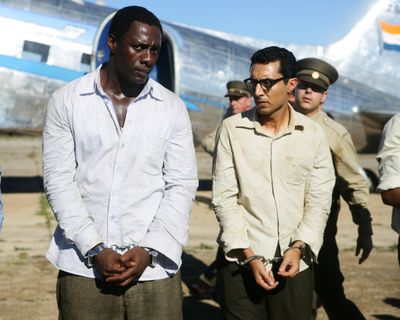As Mandela, Idris Elba dominates ‘Long Walk’

As Nelson Mandela, Idris Elba towers over the rest of the cast in “Mandela: Long Walk to Freedom.” That’s literally true and perfectly accurate. Mandela was tall, as is Elba (of the “Thor” movies and “Takers”). And Elba manages both the voice and a hint of the presence of the great man.
He tends to tower over the movie, as well, in this comprehensive but generally dry account of one man’s journey from upwardly mobile attorney to activist to revolutionary to statesman. There are no “name” actors arrayed against him as his South African oppressors. Some of the sense of struggle is lost when you spend almost all your charismatic cash on your leading man and don’t give him villains of equal stature.
With “Long Walk,” “Gladiator” and “Les Miserables” screenwriter William Nicholson and director Justin Chadwick, at home in period pieces (“The Other Boleyn Girl”) and Africa (“The First Grader”), manage a comprehensive history lesson that approaches but never quite achieves epic. They’re better at humanizing their hero than Richard Attenborough was with “Gandhi,” for instance. But there’s barely a hint of grandeur and triumph to this amazing story.
Like Gandhi, Mandela was a lawyer who came to the conclusion that working within an unjust system wasn’t going to pay off. Unlike Gandhi, Mandela turned to violence. Unlike Gandhi, Mandela was no saint. And unlike Gandhi, Mandela was a player.
“Long Walk to Freedom” captures the womanizing attorney in 1942 who figures that “education, hard work and pride” are the secrets to his success and to that of any black South African. He just has to ignore all the times the white Boers call him “boy.”
Trying to get justice for a friend murdered in police custody is what radicalizes him. He finds his purpose and his voice, speaking out for equality.
“ ‘They’ are having a party, and we are not invited.”
His political activism and wandering eye cost him his first marriage. His life, his cause and the movie get a serious jolt of electricity when he meets, courts and marries his much-younger second wife, Winnie, in the late 1950s.
Naomie Harris is at her most beguiling in their courtship and marriage scenes, two modern Africans who don first Western wedding wear, then traditional tribal attire for their nuptials. Then Harris lets us see the rage and hatred rise up in Winnie, the imprisonment, interrogations and mistreatment that fired her fury. Nelson was in prison, having been convicted of terrorism agitation, bombings of power plants and the like. Winnie, given even worse treatment (the film suggests), seethes. She decides to take everything to the next level.
In this script, Winnie is the counterpoint to Nelson’s journey from principled revolutionary to pragmatic yet still principled negotiator and conciliator. He ages into wisdom and grows into the job of “leader.” Winnie dons combat fatigues and punishes “traitors” and “informers” within her own community in ways every bit as horrifying as the regime.
The story feels simplified, but never simplistic. There’s nothing of Mandela’s dalliance with the wider world of politics (communism) and the dictators (Libya’s Gadhafi) he embraced, anyone who would lend a sympathetic ear to his and his people’s plight. Snippets of newscasts feed us the decades it took for the world to pay attention to and devise a strategy (divestment, sanctions) to help him end apartheid.
The framework captures Mandela’s tribal childhood, if not the abrupt transition from grass huts to law school. As long as the film is, one feels his famous 1960s trial and the war of wills he fought in prison are shortchanged. But there are still lovely grace notes – gorgeous African panoramas, moments of grief – personal and national.
And looming large above this “Long Walk” is Elba, in a mostly still performance, one of quietly compelling authority that dominates every moment – save for those when Harris shows up and sets the screen on fire.